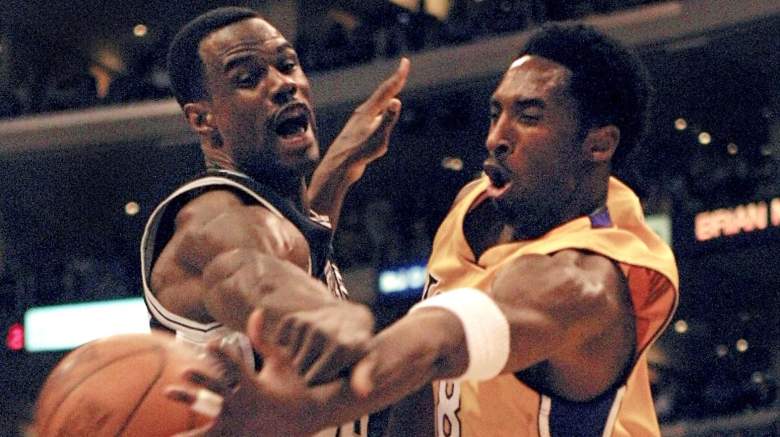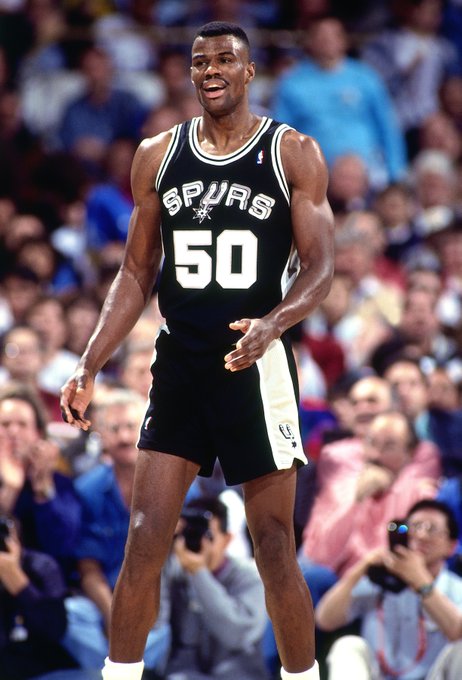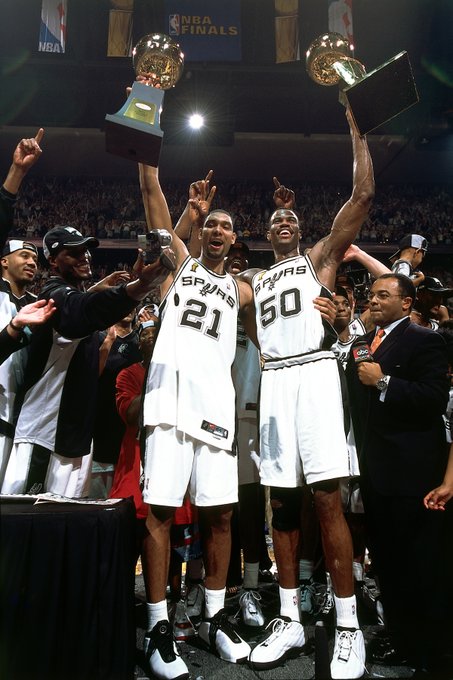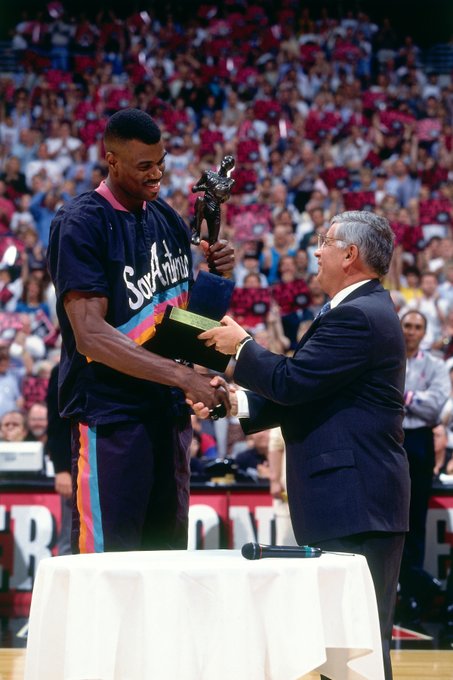
David Robinson, left, guards late Lakers great Kobe Bryant in 2001
A little more than 33 years ago, Hall of Fame center David Robinson made a decision that broke NBA hearts in two of the most successful NBA markets going at that time—in Los Angeles, where the Lakers had come off their fourth championship in eight years, and in Boston where the Celtics had just lost in the Finals to the Lakers and had won three championships in the previous eight years.
It is a moment mostly lost to history, because Robinson went on to star for the Spurs for 14 seasons, where he made 10 All-Star teams and won two championships, but before Robinson put his name on a sizable contract with San Antonio in 1987, there was a consensus he would wind up with the Lakers or, to a lesser extent, the Celtics.
“I had the opportunity to sit out and not sign with anyone and I would have been an unrestricted free agent,” Robinson told Heavy.com. “So both the Lakers and the Celtics, they were teams that were used to getting their way, and both of those teams were optimistic that I would choose to sit out those two years and make a deal with one of them.”
Robinson, an alum of the Naval Academy, was reminiscing this week about that wild period while getting himself ready for Saturday’s 121st Army-Navy football game. He will be hosting a sweepstakes through USAA at the virtual home for the game, ArmyNavyHouse.com, where fans can share photos and possibly win tickets to next year’s game.
Celtics, Lakers Positioned to Land Robinson
For those who don’t remember, Robinson was the No. 1 pick in the 1987 NBA draft, chosen by the Spurs. But because of his commitment at Navy, he would be required to serve a tour before he could turn pro—much like quarterback Roger Staubach, who was drafted by the Cowboys in 1964 but had to serve a four-year Naval commitment before he could join the NFL. Robinson and John Lehman, who was then Secretary of the Navy, worked out a compromise that would reduce Robinson’s tour to two years.
In the NBA, both the Lakers and Celtics were salivating. Though he was drafted by the Spurs, that only gave San Antonio Robinson’s rights for one year. When he came out of the Navy in 1989, the thinking was, he would be an unrestricted free agent and could sign with anyone. The Spurs could also trade his rights if it was clear he would not sign in San Antonio.
Trade proposals were floated (yes, there were rumors before the Internet). In the November 1, 1987, edition of The Sporting News, the Celtics were said to be willing to offer star big man Kevin McHale, as well as promising youngster Reggie Lewis and a draft pick. The Lakers could put up James Worthy, Byron Scott and a draft pick.
David Robinson Eventually Signed With Spurs
Those were sizable packages—McHale was an All-Star who had just averaged a career-high 26.1 points the previous season and Lewis was a rookie. Both Worthy and Scott were just 26, Worthy coming off his second-straight All-Star appearance and Scott having just averaged 17.0 points the previous year.
But that just shows what a prize Robinson was considered to be.
In a Sports Illustrated article that summer, Robinson said he was weighing his options and noted, “The big factor is my comfort level. Wherever you go, there’s going to be something you don’t like, whether it’s the traffic on the freeways or the smog during the summer.” That gave Lakers fans an inkling that he was coming to the capital of traffic and smog, Los Angeles.
Celtics team president Red Auerbach felt his team had a shot at Robinson, but he, too, thought that the Lakers had the upper hand.
“I thought he was going to wind up with the Lakers or us,” Auerbach told the Boston Globe on November 7, 1987. “Really. … It figured they (the Spurs) would trade him to a team that could sign him, which would be the Lakers or us. Honestly, I thought the Lakers had the better shot because they could have Magic (Johnson) and (Kareem) Abdul-Jabbar romance him.”
Ultimately, Robinson chose not to wait out the two years in the Navy, where he would make about $300 per week, to keep his free-agent options opened. Though he knew little about Texas, he signed an eight-year, $26 million contract that gave him the security of $1 million up front and allowed him to fulfill his obligation to the Navy with some peace of mind.
In the process, he became an icon, along with Staubach, of both sports and service.
“I thought that was the best of all worlds,” Robinson said. “It worked out perfectly. Looking back over many years, I can appreciate now what it means to so many people that I have been able to represent our school and our country in so many ways. I could not have asked for a better outcome for my career.”
Robinson: Army-Navy Features ‘Guys You Can Really, Truly Root For’
Now, it comes full circle as Robinson is a centerpiece in promoting one of the nation’s sporting treasures—the Army-Navy game—at a time when the game cannot attract big crowds because of the ongoing COVID-19 pandemic.
“It is going to be intense,” Robinson said. “It is the two military academies going after each other, after all. You are not going to lose any of that exciting value of the game necessarily. For me, I love it. I am still in awe of what it all means, what it means to our country and how people embrace the game every year.”
Considering the tenor of just about everything in America these days—tensions over how the virus has been handled and should be handled now, tensions over last month’s election, tensions over legal actions being taken around that election—Robinson says a dose of Army-Navy football should be a reminder of our better selves.
“We need these things,” he said, “with the atmosphere now being so divisive and people being so divisive, this is a great opportunity for people to see, what does it mean to serve our country, what does it mean to be rivals and opponents but not enemies, what does it mean when people are doing things without an agenda? These are the guys you can really, truly root for.”
READ NEXT: ‘Oh S***’: LeBron James Shares Strong Reaction on Start of NBA Season




Comments